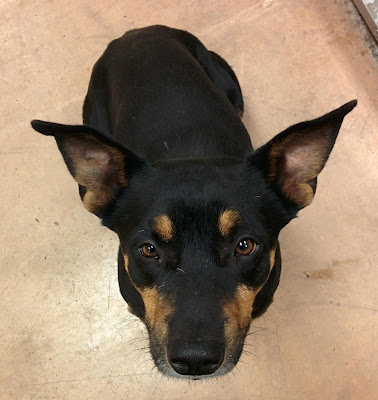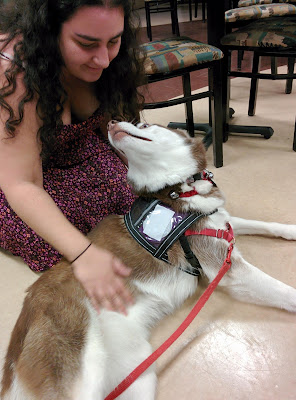Pin This!
 |
| Icy waiting for the reading to dogs program at the library to start |
Over the years I have learned a lot about how to successfully manage a facility therapy dog program in libraries and schools. I'd like to share my personal insights to help both people who run therapy dog programs, or plan to start one, and for people whose children may benefit from a therapy animal program.
THERAPY DOGS IN LIBRARIES AND SCHOOLS
I have visited many libraries and schools and they are all run differently. Most animal therapy organizations allow their member facilities to run their programs in the way that best suits them and their customers. The guidelines facilities must follow to remain in compliance usually don't include guidelines around the physical space they chooses to use for the program, or exactly how they manage the animal therapy visits. That is both good and bad.
It's nice to have the flexibility to manage the program in the way that best meets the needs of their participants, but some facilities do a better job of making pet therapy visits more enjoyable and effective. Let me share some examples and tips with you.
SOME FACILITIES RUN PET THERAPY PROGRAMS BETTER THAN OTHERS
One of my favorite visits (and Icy's too!) is the Reading To Dogs programs at the library. During these visits children read out loud to dogs, which gives them an opportunity to practice their reading and improve reading skills in a safe, non-judgmental environment. I'm not grading or correcting them and Icy doesn't care how well they read, as long as they'll give her a few pets and maybe a belly rub! Learn more about Reading To Dogs programs for kids in this post.
At one of the libraries we visited in Phoenix, the program was very unstructured. We showed up with our dogs, signed in, and were told to "just find a place to sit and we'll send the kids to you". If you've ever seen a dog in a library, you know how excited kids get when they see a dog there. They can't help themselves, they invariably come rushing over to pet the dog and start asking questions. They are oblivious to the fact that you're conducting a therapy dog reading session.
 |
| One of my favorite photos of Icy reading with one of the kids at the library. She looks so interested in doesn't she?! |
One day Icy and I arrived at the library and found a tiny corner. The first child sat down to read to Icy but almost immediately, another kid came running over, excitedly yelling, and plopped down to pet Icy and begin asking questions about her. Needless to say, the child that was reading to Icy was very put off and he immediately shut down. The second kid's grandparent came over but seemed oblivious to the fact that this was a one on one reading session. I finally had to gently suggest that he come back after the first child was done reading.
There wasn't a library staff in sight to oversee the program or help in any way. I went to this library twice before I became discouraged and never returned. This type of environment puts the therapy dog handler and the kids who want to read in an awkward position. It's not a pleasant or effective experience.
At another Phoenix library it was a totally different story. Their program was perfectly executed and managed. This library was a joy to be a part of and I continued my visits for a couple of years. I left only because we moved out of state. They did so many things right:
🐶 They had a separate room for the visits and set it up perfectly. There were no more than 3 dogs at any one time and the sessions were one child at a time reading to a dog. For kids who struggle with reading, group reading sessions can be stressful and unpleasant, lowering their confidence. Here, each child had one on one time to read and interact with the dog in a non stressful environment.
🐶 Kids signed up in advance for the program and waited outside the room for their turn to read. No other kids interrupting or making the child uncomfortable.
🐶 At the end of their 15 minute reading session, the child was given a lovely printed certificate that said "I read with Icy today!" The kids loved the certificates, it gave them a sense of accomplishment and pride.
🐶 They didn't allow therapy dog handlers to give out candy or other edibles to the children, which is smart. Sticky fingers and books are not a good combination! Parents also don't appreciate their kids being randomly given sweets or other foods in the middle of the day. They did allow us to give out stickers, which the kids loved. One or two fun stickers for each child adds a nice touch and feeling of pride and accomplishment to a therapy dog visit.
🐶 They Paid Attention! If kids started entering the room, crowding a dog, or squealing in high pitch tones they stepped in. They didn't just leave the handlers alone to supervise the groups of children who participate in the program. The handler's responsibility is to their dog. They shouldn't be left to their own devices to manage groups of children in a facility.
🐶 They had books available for the children to select to read. They also obtained input from local elementary schools on books that should be offered.
I miss that library and their staff so much! Of the many libraries we've visited as a therapy dog team, that one was my favorite.
MORE TIPS TO RUN YOUR THERAPY DOG PROGRAM WELL
🐾 Ensure therapy dog handlers don't bring any dog treats or food that contains nuts. Dogs love peanut butter treats but they should be left at home. There are so many kids with nut allergies!
🐾 Always have someone manage both the participant's signup process and the room. Don't let kids just walk in and sit down. Explain to a parent or guardian what the program is, how it works, and ask them to sign up.
🐾 Manage the visits! Be there to support the therapy dogs and their handlers, who are volunteering their time to help you and the kids at your facility. If a child starts crying uncontrollably, becomes frightened of the dog, wanders out of the room, or acts out please step in to help. It's unfair to leave therapy dog handlers to be responsible for a child that wanders off or to handle behavioral issues.
🐾 Remember that the handler's first responsibility is to their DOG. They will explain to a child how to best pet and interact with their individual dog, and they will help a child with a word or sentence if they need it but they are not teachers or babysitters. I have seen parents drop their kids off to read to the therapy dogs at the library and not return for well over an hour!
🐾 Have a cart or table with a large variety of books available for the kids to read. Many times a child selects a book that is either way above or below their level, or they just don't like the book they chose. When they have to run out of the room and search the shelves for another book, they run out of time. Have plenty of books to choose from within easy reach.
🐾 Try to limit therapy team visits to one hour, and kids' reading sessions to approx. 15 minutes per child. Most dogs become tired or need a break after an hour. Being a therapy dog is very mentally stimulating for the dog and they can get tired, or sometimes they've just had enough. If a handler feels the need to leave early or give the dog a break by leaving the room or walking outside, please respect that. The handler's biggest responsibility is to advocate for their dog. Part of that is to know when their dog is becoming stressed or has had enough. Just like people, dogs have good days and bad days. Please don't be offended!
 |
| Another adorable photo of Icy reading with a child. I get a kick out of her putting her paw on the book! |
I hope you have found these tips helpful. By following these tips your pet therapy program should run smoothly for everyone!
Have you ever run or participated in a therapy animal program? Please tell us what your experience was like in the comments!




























.JPG)
_cropStore.jpg)
